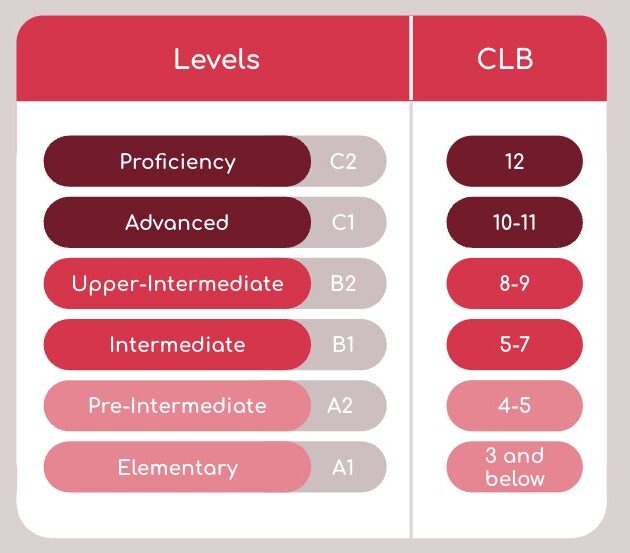Don’t underestimate the IELTS test, but don’t be scared of it either.
When it comes to choosing the right test for you, it’s worth it to consider the pros and cons of each test. Many people struggle to choose between the IELTS and the CELPIP test, and both tests come with their own set of challenges.
A lot of students assume that the CELPIP is easier, but I want to tell you some reasons why the IELTS test is actually not as scary as it seems!
So first of all, let’s focus on some benefits of the IELTS test:
The IELTS Speaking Test
The biggest benefit by far of the IELTS is the speaking test.
While the speaking test on competitor exams like the CELPIP or TOEFL are held on the computer, the IELTS is held in person with a highly qualified and experienced IELTS Speaking examiner.
Why is this important?
Speaking with a human as opposed to a computer is much more natural. As a result, you’ll feel much more comfortable and you’ll end up doing better on your test.
IELTS speaking examiners want you to do well
They’ll always encourage you to keep speaking by asking you more questions. That means you won’t feel “frozen” like you would if you were staring at a computer screen.
Didn’t understand what your examiner said? You can even ask them and they will repeat the question for you.
The examiner is there to guide you in the conversation. They’re not there to punish you. They want you to succeed, so keep going and you’ll do well.
The IELTS Speaking test is more realistic
Nobody speaks with a timer in front of them in real life. Speaking with a clock ticking in front of you like on the CELPIP test only makes you nervous! The IELTS speaking test does not include a timer in front of you. You will have a 2-minute timed response in Part 2 of your test, but your examiner will control it for you.
The IELTS Speaking Test Environment
The Speaking exam is held in a quiet and private environment between the candidate and the speaking examiner. That means candidates have the privacy and silence they need to think and speak calmly.
On the other hand, the CELPIP Speaking test is held in a noisy test environment with several other candidates speaking at the same time. This can definitely be distracting.
Test Development
The IELTS exam is a very reputable and standardized test and while the exam questions are always in development, the test format stays the same.
In other words, extra exam sections are not added to your reading or listening sections like on other tests like the CELPIP.
Many candidates are surprised to find 1-2 additional reading tasks on their CELPIP reading test for test development, which can definitely be tiresome!
IELTS Test Topics
The IELTS Speaking test topics are about you and your ideas; you don’t have to put yourself in situations. Consequently, it’s easier to think of ideas.
How you’re assessed on the IELTS exam
Both the IELTS and CELPIP test raters have very specific assessment criteria. However, the IELTS examiners do not take the “quality of a candidate’s ideas” into consideration as much as a CELPIP examiner would. Unlike relevance, the “quality” or “strength” of an idea can be subjective.
Time Management on the IELTS exam
While you will have to write more words in Writing Task 2 on the IELTS than on the CELPIP (IELTS = 250 word min./CELPIP = 150 word min), you’ll also have more time to complete your writing test if you manage your time correctly.
But let’s be realistic too and talk about some drawbacks of the IELTS test
The IELTS Listening Test
Most students and candidates complain about the IELTS listening test, especially if they need a CLB 9 (meaning they need an 8 out of 9 on their listening test). Getting 35/40 on the test isn’t easy! And there are a few reasons for this.
First of all, the listening test includes a variety of accents. Now for real life, this is actually very valuable because you’re gonna end up meeting people from all around the world, right?
But either way, many students find it hard to do a listening test with a mix of British, Australian, and American accents when they’re used to listening to say…a Canadian accent, eh!
Also, the format of the listening test is tough since you’ll have to fill in the blanks. You won’t be given a dropdown menu with choices so if you don’t hear the right answer, you’ve missed your opportunity (and you only get to listen to your test once!).
Spelling is also tricky on the IELTS listening test, and capital letters count too.
Spelling proper nouns like days of the week or months like June can be considered incorrect if spelled without a capital letter, and lots of students lose their band score just because of silly spelling mistakes.
TIP* You can write your entire listening test in capital letters to avoid losing points due to proper nouns 👍
Now if you’re booking a paper-based IELTS test, I strongly encourage that you find an exam centre that at least includes a headset for your listening test. Most exam centres are now offering the computer-delivered IELTS, but if you’re going to be taking the paper-based one, make sure you find a centre with high quality audio.
The IELTS Test Duration
Even though the test duration itself is comparable to the CELPIP (approximately 2 hours and 45 minutes), the test day experience on the IELTS can be quite long since you have to take your speaking test separately from the other exam sections.
The amount of time you’ll have to wait between your speaking test and your other exam sections will depend on your exam centre, especially with new pandemic safety protocols in place.
Many candidates have shared that they felt totally burned out and exhausted after their IELTS test day since it took up most of their day.
Spelling Counts on the IELTS Test
Spelling counts!! And spelling every word correctly isn’t always easy – even for a native speaker.
With all of the technology and gadgets that we use today, and with the help of autocorrect, we all struggle with spelling (even in our first languages, am I right?)
But unfortunately, spelling does count on the IELTS test. And unlike the CELPIP test, there is no spellcheck on the writing test.
This means that your spelling will be taken into consideration on your IELTS writing test and also on your IELTS listening test.
However, don’t worry about spelling differences between North American and British spelling as both would be considered correct.
Vocabulary on the IELTS Test
Since the IELTS test uses international English, you’ll find words that aren’t exclusively used in Canada. In fact, the test was designed by Cambridge University, so much of what you hear and read will actually be British English.
We recently had a student who said they heard the term “trash bin” on the test, but they were so used to hearing “garbage” in Canada, that they weren’t 100% sure what it meant.
So be ready to hear English from all over the world, and not just Canadian English.
The IELTS Writing Test
The topics on the writing test are arguably a bit more challenging than on the CELPIP test since they’re about globalized issues. The CELPIP writing test issues are much simpler and about everyday life, especially about life in Canada.
But on the IELTS test, you might have to talk about some pretty serious or complex issues like global warming, gender roles in education, and dealing with world hunger!
That means your critical thinking will be put to the test.
Fill in the blanks on the IELTS Reading Test
Just like on the IELTS listening test, the reading test also includes fill-in-the-blank style answers. In other words, you’ll have to complete a blank space in a sentence.
You will not have a list of options to choose from in a dropdown menu like you would on the CELPIP, so that makes it really hard to guess the right answer!
Solution: Use our IELTS reading test strategies to help you save time and get the right answers on your next reading test! Get in touch with our team for our one-on-one coaching sessions if you need help 👍
The IELTS Test Format
Some IELTS exam centres still don’t have the computer-delivered IELTS test available, which means you’ll have to write your entire IELTS essay and task 1 response by hand. This can be tricky if you haven’t written in a while (we’re always texting nowadays).
And since you can’t right an entire IELTS essay with just your thumbs, this could be a challenge.
Solution: If you’re the type of person who prefers typing, find a local exam centre that offers the computer-delivered IELTS.
Wrap up
You want to choose the right test for your profile, and nobody can make this decision for you, but I hope that learning more about the pros and cons of the IELTS has helped.
I suggest taking some sample tests from official IELTS sources.
Finally, the IELTS test is not a scam. It’s an internationally renowned English test that can open doors for you, so it’s definitely worth the investment.
If you’re planning on taking the test, it’s worth it to invest in proper training. Studying alone isn’t easy, and studying online with conflicting (and often misleading) information can definitely be confusing.
Getting the right support you need can set you up for success! Studying the right way can and will save you time, stress, and money!
‘Cause we don’t want you taking the test a bunch of times.
So get in touch with our team of Canadian exam experts for our personalized tutoring sessions so that you can finally get the band scores you need.
Because if we believe in you, you have to too!

















